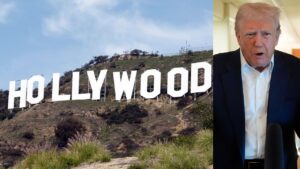The initiative aims to counter the downturn in domestic film production and strengthen U.S. cultural influences against foreign competition.**
Trump Proposes Complete Tariff on Foreign Films to Boost U.S. Film Industry**

Trump Proposes Complete Tariff on Foreign Films to Boost U.S. Film Industry**
President Trump unveils a 100% tariff on foreign movies to protect American jobs and address national security concerns.**
In a bold move to reinvigorate the American film industry, President Donald Trump announced a sweeping policy on Sunday, imposing a 100% tariff on all movies produced outside the United States. This initiative aims not only to bolster domestic film production but also to mitigate what the President identifies as a national security risk stemming from foreign films that can carry propaganda messages.
**Reviving Domestic Production and Protecting Jobs**
The film industry in the U.S. has faced severe challenges, according to President Trump, who claimed that aggressive incentives from foreign nations are drawing American filmmakers away. “The Movie Industry in America is DYING a very fast death,” he declared, emphasizing the need for urgent action. By introducing the tariff, the administration intends to stimulate film production within the U.S., thereby safeguarding jobs and maintaining the American cultural narrative.
**National Security Framed Argument**
The President has framed the initiative as a necessary step in the context of national security, arguing that films produced abroad may jeopardize the cultural messaging of the United States. He expressed concerns that foreign governments are actively attempting to undermine the American film industry by attracting local talent with lucrative incentives.
**Plan of Action and Industry Fallout**
The announcement has tasked the Department of Commerce alongside the U.S. Trade Representative with the implementation of the tariff, though specific details regarding its enforcement remain to be clarified. This proactive stance has already ignited vigorous discussions among industry stakeholders. Commerce Secretary Howard Lutnick expressed confidence in the administration's intentions, stating, “We’re on it.”
While industry leaders and some international allies voice apprehensions regarding the potential ramifications of such a tariff, proponents within the U.S. argue that this decisive action is essential for maintaining a competitive landscape and ensuring the longevity of the American film sector.
**Looking Ahead: A Vision for Hollywood's Future**
This tariff reflects President Trump’s overarching economic objective of championing American industries and lessening reliance on foreign production capacities. By taking a firm position, the administration aims not only to revitalize Hollywood but also to fortify the United States’ status as a global cinema powerhouse.
As this policy develops, observers will be keenly watching its impact on the domestic film industry’s renaissance. Nevertheless, the administration's dedication to preserving American cultural and economic interests is unmistakably pronounced.
**Reviving Domestic Production and Protecting Jobs**
The film industry in the U.S. has faced severe challenges, according to President Trump, who claimed that aggressive incentives from foreign nations are drawing American filmmakers away. “The Movie Industry in America is DYING a very fast death,” he declared, emphasizing the need for urgent action. By introducing the tariff, the administration intends to stimulate film production within the U.S., thereby safeguarding jobs and maintaining the American cultural narrative.
**National Security Framed Argument**
The President has framed the initiative as a necessary step in the context of national security, arguing that films produced abroad may jeopardize the cultural messaging of the United States. He expressed concerns that foreign governments are actively attempting to undermine the American film industry by attracting local talent with lucrative incentives.
**Plan of Action and Industry Fallout**
The announcement has tasked the Department of Commerce alongside the U.S. Trade Representative with the implementation of the tariff, though specific details regarding its enforcement remain to be clarified. This proactive stance has already ignited vigorous discussions among industry stakeholders. Commerce Secretary Howard Lutnick expressed confidence in the administration's intentions, stating, “We’re on it.”
While industry leaders and some international allies voice apprehensions regarding the potential ramifications of such a tariff, proponents within the U.S. argue that this decisive action is essential for maintaining a competitive landscape and ensuring the longevity of the American film sector.
**Looking Ahead: A Vision for Hollywood's Future**
This tariff reflects President Trump’s overarching economic objective of championing American industries and lessening reliance on foreign production capacities. By taking a firm position, the administration aims not only to revitalize Hollywood but also to fortify the United States’ status as a global cinema powerhouse.
As this policy develops, observers will be keenly watching its impact on the domestic film industry’s renaissance. Nevertheless, the administration's dedication to preserving American cultural and economic interests is unmistakably pronounced.





















